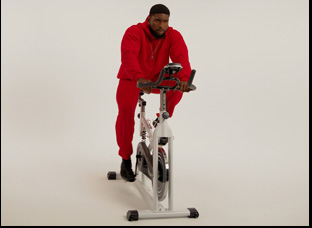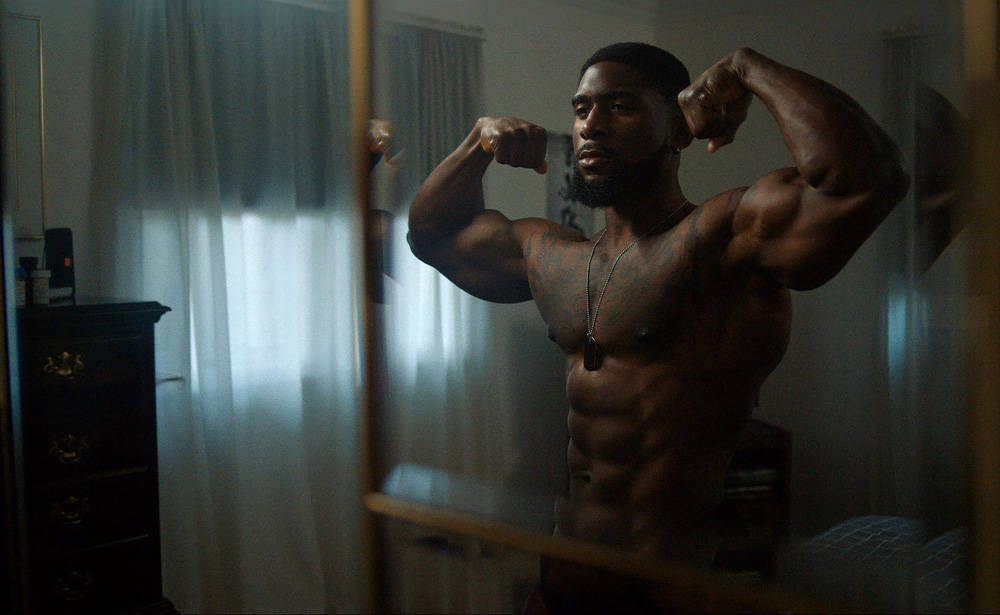It wasn’t as much of a stretch as one might think for Raymond Knudsen to leave behind one stage as a competitive bodybuilder for another in filmmaking when he had ample muscles to flex on both. With the camera, he has been interested in looking beyond the moment that most bodybuilders spend their lives preparing for, flashing their taut biceps and abs to be judged yet facing no greater scrutiny than within themselves, wondering whether they were on the right diet or took the right supplements to achieve their best form. With “Stage Ready,” the director shows this discontent simmer within an Adonis (Chibueze “Zay” Anaysor) to everyone’s eye but his father, seen as buff and brawny at tournaments but looking far more weak-willed as he spends evenings alone eating jelly doughnuts and not knowing when to stop training.
When “Stage Ready” felt like a slow burn, it comes across now as tinder to Knudsen’s follow-up “Prep,” an explosive character study that once again features Anaysor as a bodybuilder taking on more weight than any barbell could hold. Set to pulsing house music, the film crackles with glimpses of the muscleman’s unforgiving routine where exercise is only interrupted by the occasional meal of beef and broccoli to provide calories to burn and surges of testosterone threaten to overwhelm him, leading to fantasies that only reinforce a reality that may never be enough. Knudsen intersperses clips from the bodybuilder’s vlogs that reflects an idealized public persona with surreal imagery expressing how his mind races with feelings of inadequacy, some of which stems from childhood and while he digs deep for the drive to perfect his body, the film goes even further to explore what it will take to get his mind right.
“Prep” is actually one of two films that Knudsen has headed to the Indie Memphis Film Fest this week, where his production company Big Blue Pictures is also behind Melina Valdez’s “Weapons and Their Names,” about a teen trying to process the death of her stepfather with an excursion into the forest with her best friend, and in telling the stories of characters searching for the strength to carry on, the filmmakers show plenty in these finely observed character studies. On the eve of the two shorts finding their way into Tennessee, Knudsen spoke about combining two of his biggest passions with “Prep,” turning his family’s home into a studio for the production and how he found his star Anaysor.

I don’t know, man. I loved filmmaking since I was a kid. I used to make my own movie posters and collect the entertainment ads that came out every Friday and I had a background in editing. I started to make my own fan trailers in middle school and I went to the Apple Store every weekend when they used to do something called “one-to-one” and I would just sit with a trainer and they would help me make my fan trailers. Then I went to a high school in West Palm Beach and started making movies there and eventually that led to Florida State for their film school. Now I’m living in New York, making shorts with my friends for three years now and starting to work on more and more projects and I’ve made two films about bodybuilding [since] it’s still something I feel very passionate about and I feel there’s a lot to explore. Those who have made movies about bodybuilding haven’t done it themselves, so it’s always a third person POV.
It’s interesting because when I went back to watch the films, it looked like you’d been waiting to tell these stories after getting your feet wet.
It happened organically. When I was in college, I started watching fitness YouTubers who happened to compete and live that lifestyle and I considered myself out of shape at the time that I decided to compete. I’ve always been an all-or-nothing person and I’m trying to find that middle ground to this day, so when I considered myself out of shape, I was like, “I’m going to get into the greatest physical shape possible.” But during that pursuit, I saw how challenging the experience is and how many layers there are that I feel a lot of influencers aren’t transparent about, specifically one’s relationship to their body and food and the expectations that society has. I think that sentiment extends beyond bodybuilding – as other professional athletes or artists, we can relate to how crazy the mind can become when you push yourself to an extreme. And “Stage Ready” was a very traditional slice-of-life film. There was not much dialogue and having made two movies together, that’s just part of Zay and I’s process. But with “Prep,” it felt like it had to be the complete opposite, very loud and in your face and I wanted to try a lot of new different things. I didn’t know if it was going to work or not, but I was very grateful to have a cast and crew around me that believed in what we were trying to do.
How did you and Zay first connect for “Stage Ready”?
Both movies are very autobiographical, and when I was making “Stage Ready,” I knew that I didn’t have the budget to transform an actor’s body into one of a bodybuilder, but I thought maybe I could do the reverse where I cast someone with little to no acting experience, but we shoot it like Andrea Arnold where I’m just letting the actor do stuff that they’re very used to doing in real life and hopefully finding some through line emotionally. I was really inspired by a lot of European filmmakers that were more about showing how the character’s feeling versus saying what they’re feeling. So much of bodybuilding is a visual sport, and when you’re on stage, you’re not judged on what you say. It’s just how you look. So I thought those two went hand in hand.
In “Stage Ready,” it’s about this guy who’s trying to connect with his dad, showing a lonelier perspective of the sport, which isn’t necessarily the newest thing, but in bodybuilding, again, it’s very unexplored. So I DM’d a lot of bodybuilders on Instagram, and Zay happened to play football in high school and is still a competitive bodybuilder and understood what I was trying to show. He is based in Houston, and I was going to school in Tallahassee, and I told him “I don’t have a whole lot of money, but I’ll fly you out here and put you up and we’ll make this movie.” Zay did a great job acting alongside real actors who’ve had experience, and it was the same with “Prep.” This movie was a lot heavier thematically, and to get someone on board to go on that journey is not the easiest task, but I already had this relationship and trust built with Zay, and it was really challenging with all the spit takes, all the food he had to eat and also to get to that emotional place. I didn’t know if he could do it, but he was our best chance and he did an amazing job and I’d like to keep working with him.
This isn’t something I would’ve noticed unless I watched it a few times, but it feels quite big yet the shoot probably was pretty contained when you’ve got this central stage where a lot of the action takes place. What was that like to have as a building block?
My childhood house is still in New Jersey, and I knew from making commercials in the city that making a short here [in New York] is not going to be the cheapest endeavor, so I figured, “Let’s go to my house in Jersey. It’s a big sleepover. We’re going to make this movie over a week.” And we supplemented my house with smaller studio spaces that are farther from the city, but obviously much cheaper. And in the writing process, I knew I wanted to utilize black and white voids to represent a headspace or some deep place in his psyche. It’s ambiguous and maybe it’s real, but we shot you know the bodybuilding competition and the dance sequences in there. It was very convenient to use that same space as a club or the space for the dancers and you’re just changing lighting and doing a little bit of set dressing. I was very inspired by Gaspar Noé’s ”Climax,” so I wanted to give that vibe and utilize top-down shots. I’ve always had a great appreciation for dancers and when I see a movie like “Climax,” there’s just something with the energy of the whole piece that made sense [where] the way it’s shot is comes off as very specific and regimented, similar to bodybuilding, but as this character loses his mind, the dancing becomes messier.
This does make such wonderful use of music. Did you have the rhythm of this in your head even before shooting or did that take shape in the edit?
A little bit of both. A lot of the music did stay throughout the writing process, into production and into post, but we took a lot of liberty with the visuals and experimented a lot. The editing process was long. We shot this movie late 2021, and we were editing most of 2022. But the music was the heartbeat of the movie, and house music is something I’ve loved for a very long time and I just haven’t seen utilized [much] in a movie, but it’s very repetitive and a lot of the lifestyle of bodybuilding is very repetitive. I wanted to transform that rhythm into something of a nightmare and by the end of it, there’s no music. It’s just emotion and hopefully it just leaves people feeling something.
Something else I felt was remarkable are the home movies of a kid’s birthday party that I was convinced you made decades ago, but realized how from how the actor is used later, that couldn’t possibly be. How’d you film in a Chuck E. Cheese?
A lot of people think it’s a home video. [laughs] But basically we went into a real Chuck E. Cheese and we threw a birthday party. I knew that asking permission from the get-go to shoot something like this would probably not be approved, so I wanted to ask for forgiveness instead of permission. But basically, we show up and it’s just almost like a dad is filming this party. There’s no lights and we tell all the extras not to say that you’re with a film shoot, we’re throwing a real party. But when we show up, one of the extras is hanging out front, and after greeting him, I tell him, “We’re being a little low key today,” and he was like, “Oh shit, I told him I’m here for the film shoot.” And then my production designer walks in with a bunch of clothes to outfit people. A little after that, the manager caught on to what we were doing, but she was kind enough to let us keep shooting, just as long as we weren’t filming other kids. But yeah, people think that it’s archive footage from a real birthday party.
Your production company logo, spelled out in cups tucked into a fence over a freeway overpass, also appears to have a very cool story behind it and I imagine that wasn’t easy to pull off, either.
That was from when I graduated from film school and I knew that I wanted to have some name or brand in front of my projects and Big Blue Pictures is very symbolic. I’m a huge New York Giants fan, and I happened to grow up on Big Blue Trace in West Palm Beach, Florida, following this high school football team a number of years ago, making a docuseries. I was looking at their fence one day and it said, “Go Big Blue,” so those three things led to the name, and in 2020, during COVID, that was the last time I competed in bodybuilding and I was in West Palm Beach, and drove to see my coach and I knew that I wanted to shoot some sort of leader with cups in a fence. You see that very often at high schools, and after one of my gym sessions, I drove under an overpass, like one that you could walk over, and I was like, “Let’s try this out” and my friends and I put cups into the fence. I shot that on my cell phone, through a mini DV app. People love that too, so I think I’m going to stick with that for a while.
It’s very cool. And it’s actually in front of a couple films at Indie Memphis this week. What’s it been like getting this work out there?
It’s surreal. I’ve been working on this stuff for a while, so it’s been a long time coming, but I’m just grateful for the opportunity to screen at places like Indie Memphis. I’ve heard nothing but great things and it seems like one of the best regional festivals in our country. I’ve been blessed to go to a few others this year, like Mammoth Lakes, and New/Next that started in Baltimore this year, so I’m just hoping to keep it going and I’m grateful to keep making stuff with people that I love and respect and care about.
I’m also happy too that people are connecting with the work. Specifically with ”Prep,” it’s obviously a very personal movie, but it’s way bigger than myself and I just hope that it starts a conversation about a number of things. I look forward to getting the movie online early next year and most of the bodybuilding community hasn’t seen this movie yet, so I’m excited to get this on YouTube and to share it on Reddit and hopefully start a conversation about things that more people in that community are starting to talk [about]. I’m also starting an online interview series called “Bodybuilders Anonymous,” similar to “Soft White Underbelly,” which is on YouTube, just trying to share these people’s stories. I feel like the stuff that I’ve talked about in private with a lot of these bodybuilders so far is very moving and very powerful and I just want to share that with the world. I don’t know where that’s going to lead, but I want to leave that as one of my marks on this earth [because] I feel like it would benefit the community as a whole. But everyone has a relationship with food and with their body and I hope everyone connects with the work.
“Prep” will screen at Indie Memphis as part of the Departures shorts program on October 28th at 10:30 am at the Hatiloo Theatre and will be available to stream online from October 24th through October 29th.




